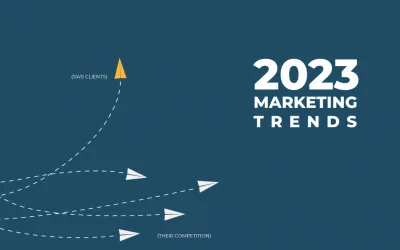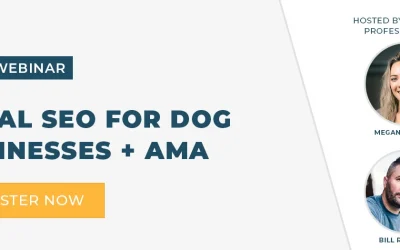How to Use Branded SEO to Assist Your Other Marketing Activities
At a time where business markets are becoming increasingly competitive, it’s more valuable than ever to invest in your brand’s online presence. While the word-of-mouth marketing strategy is tried and true, failing to invest in SEO can be detrimental to the long-term success of your business.
After all, a business with a great product is sure to gain traction and success through referrals; but then how do those new referrals find you, research you, and contact you?
93% of all internet experiences start with a search engine. That means that even people who know who you are, the name of your company, and what you do, are still searching your brand online. Were they referred your name and searched you to get more information? Did they see an ad for your brand, product, or service and tried to find you via search?
Your brand presence on Google is one of the most important elements of modern marketing. 82% of consumers read online reviews before making a purchase, hence the importance of having a great branded results page that allows you to control that narrative of your brand for you consumers.
Branded SEO Search Results for SERP (Search Engine Results Page)
You most likely understand basic SEO, but here’s a quick rundown:
- SEO stands for Search Engine Optimization
- It’s what allows your site to position well on search engines versus a competitor
- You optimize your site for traditional service, transactional, or informational search terms
Something you maybe didn’t know, however, is that SEO can be used as more than just a tool to increase product, service, and local rankings. In fact, it’s an extremely powerful tool to improve branded searches, or, any search that includes your brand name.
This means that if someone searches for “Adidas women’s shoes,” almost all results will include pages from Adidas, since their brand name was included.
Unbranded searches are searches that are generic, or don’t include brand names. An example search is “women’s shoes.” If you’re Adidas, you may still show up on the search page, but you will be one of 20+ other brands that fit that description.
With more and more searches stemming from branded queries, even “offline” brands are seeing about 60% of organic search traffic from branded queries. Why is this important? Well, the more content you have to offer that is tied to your brand (blogs, product pages, social media feeds, alternate publications, etc), the more results available when a user makes a branded search.
Favorable content and a well-executed brand strategy ensures you can influence what searches see when they run a branded search.
Here’s a challenge: check your current website metrics and see for yourself; we bet that more than half of your organic search activity is coming from branded searches.
Perfect SERP Example
Look at the SERP for Moz:
- A paid ad to capitalize on SERP real estate
- Their website with links included to free services
- A recent blog feed
- A Twitter Feed and YouTube Videos
- Rich snippets (the data and information below link titles) and a knowledge graph (the information block on the right hand side of google)
If someone googles Moz, they are going to get the best possible representation of the business due to the multiple links and content streams.
This company is controlling their own narrative and taking control of their SERP. Even look at the SERP for Signature W Studio; it’s a great representation for our brand even though we are a fairly new agency. This is the power of branded SEO.
What Should a Good Branded Search Results Page Look Like?
These items won’t always apply to every business, but a good branded SERP can include:
Your website with site links
First and foremost, it’s absolutely essential that your website is indexed with links to relevant content.
Knowledge Graph or GMB listing
Make sure to claim your organization’s Google My Business to ensure a relevant knowledge graph/listing pops up on SERP
Social media profiles, youtube videos, and blogs
Content, content, content! The more media exposure you have through social media, video & copy, the more brand exposure you will receive with SERP
Positive Reviews
Reviews, usually included in the knowledge graph, are like your own display of online referrals. Make sure to ask satisfied clients to leave you a review on Google so that these show up on SERP.
Rich Snippets and FAQs
Inside of your website and using schema markups, you have the opportunity to add in snippets of information/facts to better describe & rank your content.
Other sites covering you
Try to get your brand recognized by other websites, blogs, and companies to increase the scope of your brand name and website. This all comes back to content: the more (good) content the better.
What to avoid
When developing your strategy, it’s important to avoid two main things: other brands getting real estate in your search and negative reviews. Organically increasing positive reviews and a ton of branded content, you’ll be best positioned to weed out any third parties.
Branded SEO, step by step
Let’s go through the steps you need to take to get the best possible branded SERP:
1. Start with Branded Keyword Research
Identify what keywords people are using to search your brand/product/service. Use Google Search Console and other keyword research tools to gather a set of keywords that are relevant and have great search volume.
Then optimize your website by editing current content or creating new content around these phrases.
Tip: Don’t ignore longer tail phrases. Branded search terms are not just your brand, they can typically include other phrases such as brand reviews, how to _____ with brand, brand pricing, alternatives to brand, etc.
2. Make sure your site is easy to crawl
Have a clear URL Hierarchy, this will allow search engines to index the site properly. A clean structure will allow search engines to utilize site links and additional pages in search.
Use breadcrumbs and breadcrumb schema to help aid the search engines in the crawl.
3. Invest in On Site Content
Always be creating robust and relevant content on your site. Write/create blogs, videos, service and product pages, etc.
4. Invest in Off Site Content
Work on off-site content such as guest blogs and industry publications. This allows Google to have alternate links to reference and improves your backlink profile.
5. Use Schema Markup
There are hundreds of different schema options that indicate to bots and crawlers what type of site content exists on your site.
This is code maximizes your exposure on SERP and provides search engines with the ability to position your brand in different ways.
Schema is the basis of rich snippets, questions and answers, and the knowledge graph. Schema also ties your brand to other items like social profiles.
6. Invest in reputation management
Ask for great reviews and respond appropriately to negative reviews.
7. identify and get listed in local citations
A local citation is any online mention of details for your business (name/address/number). Local citations directly impacts local search engine results, specifically the Map Pack.
Always setup or claim your business on Google My Business. Post on social networks regularly and mention local terms, businesses, addresses and events when possible to up your brand exposure for local SERP.
Your Path to a Better Online Reputation
If you follow these steps, carefully preparing branded content that positively highlights your product/service while working to update your online reputation, helps control your online narrative.
Maximizing SERP and branded content is a cornerstone tactic to succeed in the world of digital marketing and take the reins on the success and scaling of your business.





